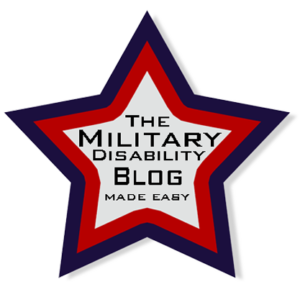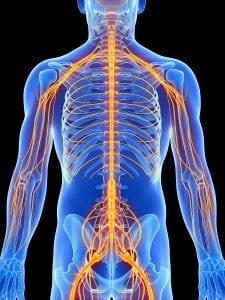On March 20, 2025, we will stop accepting new Military Disability Made Easy subscriptions. For more information about how this change may impact your subscription, click here
Rating Pure Autonomic Failure for Military Disability
- Published:
- Last Updated: October 5, 2022

Pure Autonomic Failure is a condition where the autonomic nervous system (the part of the nervous system that controls the functioning of the organs) does not work properly. Pure Autonomic Failure mostly affects blood pressure, but can affect other functions as well. The most common symptom is dizziness or fainting because of the blood pooling in the legs since the blood pressure is not strong enough to push it back up to the rest of the body. There is no cure for this condition, and it gets worse over time. It normally does not appear until at least middle age.
Since Pure Autonomic Failure can affect different systems in the body, it can be tough to assign a Military Disability Rating to. The main rule is that the Rating Authorities should choose the VASRD code that is closest to YOUR condition. So first, we need to find a nervous system code that has similar symptoms as your condition.
Some possible nervous system codes include:
Code 8105 – Sydenham’s Chorea. Although pure autonomic failure is not caused by an infection, Sydenham’s Chorea can be degenerative, and can affect the autonomic nervous system.
Code 8019 – Cerebrospinal Meningitis. Again, pure autonomic failure is not caused by meningitis, but it can have many similar symptoms of meningitis, including heart problems, seizures, etc.
There are many possible nervous system codes. Remember, just pick the one that is closest to your condition. Ultimately, the nervous system code does not really matter since most nervous system codes are rated on the symptoms they cause. So, regardless of the code chosen to represent your condition, it will still be rated on the symptoms it causes. For example, if your condition causes high blood pressure, it would be rated under code 7101 (hypertension). If it causes difficulty breathing, it would be rated under code 6841 (difficulty breathing due to spinal cord damage), etc.
The final code for each of the symptoms will look like this: 8019-7101. The first 4 digits refer to the nervous system code that is chosen (8019: Cerebrospinal Meningitis), and the last four refer to the particular symptom that is being rated (7101: Hypertension). This is called an analogous rating.
For the VA, every symptom can be rated separately. For the DoD, only the symptoms that independently cause you to be unable to perform your job at the time of separation can be rated. For example, if your condition causes high blood pressure and neck pain, then the VA will rate both. The DoD will only rate the symptoms that interfere with your ability to do your job. So, if the neck pain is so severe that you can’t perform your duties, it can be rated. If, however, it is just irritating, but doesn’t really limit your abilities, then it can’t be rated.
It can be rather confusing, but just focus on finding and rating each of the symptoms caused by the Pure Autonomic Failure. You can do it!
Recent Posts
TDRL vs. PDRL—Which is better for disability benefits?
February 13, 2025
Leukemias and Multiple Myelomas NOW on the Presumptive List
January 9, 2025
Two MORE Conditions added to the Burn Pit Presumptive List
January 3, 2025
The 2025 VA Disability Rates are here!
December 2, 2024
About Us










11 Comments
I have been recently diagnosed with autonomic failure. I have all the same symptoms plus some. I am currently undergoing testing at Walter Reed. I have 12 years of active duty with 28 months deployed in combat. I am assigned to the WTU at Fort Belvoir and will most likely be medically retired. This is great information to know that each symptom can be claimed. This condition is very limiting and has sent me to the Emergency Room almost 10 times and three days in the hospital since June of 2015. One collapse happened while driving so I cannot drive by doctors orders. It's frustrating from being my division NCO of the year to not being able to walk without a cane because I am that much off balance.
So sorry to hear about your case. You'll definitely qualify for disability for this, no question, and should get a decent rating. They may put you on TDRL for a time to get your condition fully stabilized with treatment, but you'll still get disability compensation during that time.
Thank you for your reply Dr. Johnson. All the symptoms that I experience during a collapse or even a near collapse are tunnel vision, loss of fine and gross motor skills, speech limitations I can only say one to two words, hyperventilating, chest pain, involuntary muscle convulsions, hand tremors, lightheaded, dizzy and sudden urge to urinate. Recently I have developed whole body jolts that I can feel starting at the top of my spine and travel down then push my body outwards. These occur mostly standing still and urinating but also sitting and laying down. The doctors have discovered disturbances while urinating and I am therapy for that. I looked at TDRL but I will just ride out my time here and use as much of the opportunities that are available for the WTU soldiers. They have not even started med board process yet.
Yes, until they start the MEB Process, you don't need to worry about anything yet. Just focus on your treatments, and hopefully your symptoms will stabilize soon.
I have started getting migraines and are increasing in pain. So far I have had there within a month time frame. I just had on last night. Do you have any advice as to think it is or isn't related to this autonomic dysfunction? If so what tests should be conducted?
There aren't any tests for migraines in relation to autonomic dysfunction. Just make sure that you are telling your doc about them and that he is recorded them and their frequency and severity. He can prescribe meds to help control them as well.
nice
I am a 40 plus year type 1 diabetic. I have been symptomatic (autonomic neuropathy) for a while but it is getting increasingly worse. I collapsed recently and am dizzy upon standing in a regular basis. I am currently at a 90% rating for diabetes and peripheral neuropathy. Wondering if autonomic neuropathy can be verified by testing? And if so is there a rate associated with this condition?
The autonomic nerves can be tested and rated depending on the dominant nerves affected (cranial nerves, etc.) or on the main symptoms that they cause.
http://www.militarydisabilitymadeeasy.com/thecranialnerves.html#nerves
In your case, dizziness seems to be the dominant symptoms, which could be rated as a Balance Disorder:
http://www.militarydisabilitymadeeasy.com/theears.html#balance
As long as they cause distinctly unique symptoms, they can be rated in addition to your current peripheral neuropathy ratings.
Currently I was diagnosed with pure autonomic failure after 2 years of fatigue and fainting, dizziness, occurring the past 9 months. I am rated as a disabled vet due to nerve damage and pain in my feet, and eczema at 50%. I was prescribed ibuprofen 800 mg for foot pain for over 9 years. I was told that I could take 1600 mg when the pain was bad. Now I have tons of stomach issues to include celiac, and autoimmune issues. The issues have been ongoing for many years, which include 2 surgeries. Would the VA link my PAF/autoimmune/stomach issue with Ibuprofen? I have researched tons of articles that show a connection with that. Just want to make sure I have my paperwork in order to file properly. Most recently I had to file for disability for retirement with teacher retirement system, because my fatigue is so bad. It was approved in 2 weeks. I don't know what I will do to make up the money I will lose. I was making decent money as an asst. principal. I love my job, but unable to have enough energy to work, and do anything else in my life. Please advise.
There is medical research that links the overdose (more than 3200mg/day) of ibuprofen with your conditions, but not as much that proves the long term effect of taking the prescribed amount daily for many years.
If you could show enough connection between the development of your conditions and your long-term use of ibuprofen, along with strong NEXUS Letters from your physicians linking them, the VA could grant them secondary to the ibuprofen usage and your service-connected foot pain.
http://www.militarydisabilitymadeeasy.com/nexusletters.html